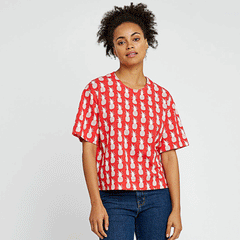What's the Deal with Organic Cotton
Close your eyes. Okay, actually open them - we want you to read this. Imagine your wardrobe past and present. Think about your favourite pieces of clothing. Maybe you’re conjuring a cosy sweatshirt, a pair of jeans, a faded t-shirt, or that denim jacket you’ve had since you were a teenager. Odds are, cotton has a prevalent presence in your closet.
Easy question: How much cotton do you think you wear?
Harder question: How much of that cotton is organic?
The idea of shopping organic can get a big eye roll from shoppers, and fair enough. Organic products are often more expensive; they can be less accessible; and if you don’t have the time to understand the impact of not shopping organic, the whole organic thing might feel like it doesn’t matter to you or that you’re not affected by it. But guess what, we don’t live in a vacuum bubble where our individual actions don’t impact others. We’re all in this together. Our choices as consumers have repercussions, and we need to do our best to reduce harm so that everyone can live a better and healthier life.

Conventional cotton farming
According to cottontoday cotton fields occupy 3% of the world’s agricultural land and supply 30% of the world’s textile fibre demands. Cotton is an incredibly versatile crop, which is why it’s so heavily used.
As it stands, cotton is considered to be one of the dirtiest crops as it’s sprayed with various insecticides and pesticides in order to increase yield. Sources estimate that cotton crops use 16-25% more chemicals than any other crop. Others say that cotton uses 7% of the world's pesticides and 16% of the world’s insecticides.
The current conventional method of cotton farming wouldn’t win any environmental awards. Production requires large amounts of water, land, and chemicals to keep yields up to the demands of fast fashion. These chemical pesticides and insecticides leak into the water and food supplies where the cotton is grown and they might even be on the clothing you’re wearing right now.
Cotton farmers are experiencing the negative effects of these chemicals. In 2017, 20 farmers and labourers in Maharashtra, India died due to pesticide poisoning. Additionally, the World Health Organisation contributes over 20,000 deaths in developing countries to pesticide poisoning.
What is organic cotton?
Organic cotton is cotton that is grown without the use of genetically modified organisms (GMOs), toxic pesticides or insecticides, and synthetic fertilisers. Instead, cotton is grown using traditional methods along with natural scientific innovations to ensure a crop with minimal impact.
Not only is organic cotton grown responsibly, but it’s also produced in a more ethical way. Crops are harvested through natural defoliation as opposed to using toxic chemicals. Cotton is whitened with peroxide instead of chlorine bleach. Manufacturers often also take measures to ensure fibres are dyed using lower impact or water-based inks.

Why should you use organic cotton?
Organic cotton has a ton of benefits. Of course, there’s still the issue of cost and that no kind of mass production is great for the environment. But, it’s much better than the alternative, which we’ve already learned introduces a swathe of chemicals into the environment.
Reduce exposure to harsh chemicals
This one is simple. We don’t know of anyone who prefers to be exposed to toxic and harmful chemicals. Have we mentioned that the pesticides and insecticides used are potentially cancer-causing and unintentionally kill millions of animals each year? Yikes! Choosing organic cotton reduces the number of harsh chemicals you’re exposed to, and if that doesn’t make you feel better, we’re not sure what will.
Protect farmers and agricultural workers
By using organic cotton, you are supporting an industry that values the health and welfare of those involved. In organic cotton farming, workers are not exposed to the harmful chemicals that they would be in conventional cotton farming. No one should have to sacrifice their health for someone else’s clothes.
Keep our food clean
Cotton isn’t only used in textiles, it’s also used in food. All of the chemicals that we are concerned about being on our clothes can also make their way into our food. Leftover cotton cellulose fibres are used as additives in food because of its low caloric value. Cellulose can be found in foods such as processed cheese, ice cream, mustards, soups, seasonings, sweetener, cereals, diet drinks, and that’s just the beginning. Cottonseed oil is used in vitamin E production and lard substitutes such as Crisco. Cottonseed meal is fed to livestock which is used in meat and dairy production.
So, if the cotton isn’t clean, you can bet a ton of our food isn’t either.
Support better factory conditions
It’s no secret that a lot of clothing is produced in poor conditions by incredibly exploited workers. The Global Organic Textile Standard requires a certain level of standard for workers before issuing their stamp of approval. Child labour, discrimination, and forced labour are among some of the things that are not tolerated.

Reduce microfibre pollution
Often, conventional cotton is mixed with other fibres such as acrylic, polyester, and fleece to create a cotton blend. However, these fibres are synthetic and are released into waterways during washing. This microfibre pollution, which is estimated to enter the ocean at a rate of 1.7 tons a year, does irreversible damage to marine life and especially coral reef ecosystems. Garments made of 100% organic cotton don’t have this microfibre issue because they are only made of clean cotton.
Buy garments that last longer
You know those shirts that you wear 3 times and the sleeve falls off or they come out of the washing machine all twisted? Not with organic cotton. Because the cotton hasn’t been exposed to chemicals and thus broken down or damaged, garments made with organic cotton tend to last longer. This helps keep your wardrobe more sustainable and reduces waste.
Feel better about your clothes
When you know you’re clothes are coming from a good place it’s easy to feel better about it. The added piece of mind will get you more excited about your clothing, but more importantly, you can feel comfortable knowing that what your clothes are non-toxic and aren’t causing inhumane suffering to others.
What is Lowie doing?







